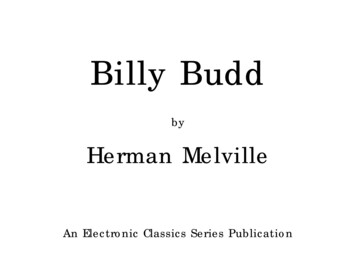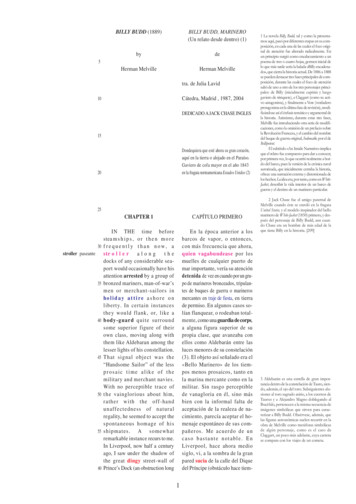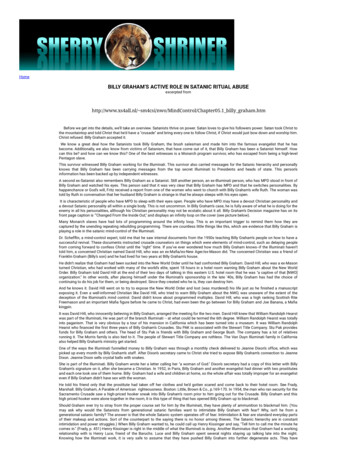
Transcription
Billy BuddbyHerman MelvilleAn Electronic Classics Series Publication
Billy Budd by Herman Melville is a publication of The Electronic Classics Series. This PortableDocument file is furnished free and without any charge of any kind. Any person using thisdocument file, for any purpose, and in any way does so at his or her own risk. Neither thePennsylvania State University nor Jim Manis, Editor, nor anyone associated with the Pennsylvania State University assumes any responsibility for the material contained within the documentor for the file as an electronic transmission, in any way.Billy Budd by Herman Melville, The Electronic Classics Series, Jim Manis, Editor, PSU-Hazleton,Hazleton, PA 18202 is a Portable Document File produced as part of an ongoing publicationproject to bring classical works of literature, in English, to free and easy access of those wishingto make use of them.Jim Manis is a faculty member of the English Department of The Pennsylvania State University.This page and any preceding page(s) are restricted by copyright. The text of the following pagesare not copyrighted within the United States; however, the fonts used may be.Cover Design: Jim ManisCopyright 2001 - 2012The Pennsylvania State University is an equal opportunity university.
Herman MelvilleBilly Buddtrace of the vainglorious about him, rather with the offhand unaffectedness of natural regality, he seemed toaccept the spontaneous homage of his shipmates. A somewhat remarkable instance recurs to me. In Liverpool, nowbyhalf a century ago, I saw under the shadow of the greatdingy street-wall of Prince’s Dock (an obstruction longsince removed) a common sailor, so intensely black thathe must needs have been a native African of the unadulterate blood of Ham. A symmetric figure much above theaverage height. The two ends of a gay silk handkerchiefthrown loose about the neck danced upon the displayedebony of his chest; in his ears were big hoops of gold,and a Scotch Highland bonnet with a tartan band set offhis shapely head.It was a hot noon in July; and his face, lustrous withperspiration, beamed with barbaric good humor. In jovialsallies right and left, his white teeth flashing into herollicked along, the centre of a company of his shipmates.These were made up of such an assortment of tribes andcomplexions as would have well fitted them to be marchedup by Anacharsis Cloots before the bar of the first FrenchHerman MelvilleChapter 1In the time before steamships, or then more frequentlythan now, a stroller along the docks of any considerable sea-port would occasionally have his attention arrested by a group of bronzed mariners, man-ofwar’s men or merchant-sailors in holiday attire ashore onliberty. In certain instances they would flank, or, like abody-guard quite surround some superior figure of theirown class, moving along with them like Aldebaran amongthe lesser lights of his constellation. That signal objectwas the “Handsome Sailor” of the less prosaic time alikeof the military and merchant navies. With no perceptible3
Billy BuddAssembly as Representatives of the Human Race. At eachspontaneous tribute rendered by the wayfarers to this blackpagod of a fellow- the tribute of a pause and stare, andless frequent an exclamation,—the motley retinue showedthat they took that sort of pride in the evoker of it whichthe Assyrian priests doubtless showed for their grand sculptured Bull when the faithful prostrated themselves.To return.If in some cases a bit of a nautical Murat in setting forthastride the weather yard-arm-end, foot in the Flemishhorse as “stirrup,” both hands tugging at the “earring”as at a bridle, in very much the attitude of young Alexandercurbing the fiery Bucephalus. A superb figure, tossed upas by the horns of Taurus against the thunderous sky,cheerily hallooing to the strenuous file along the spar.The moral nature was seldom out of keeping with thephysical make. Indeed, except as toned by the former,the comeliness and power, always attractive in masculinehis person ashore, the Handsome Sailor of the period inquestion evinced nothing of the dandified Billy-be-Damn,an amusing character all but extinct now, but occasionally to be encountered, and in a form yet more amusingthan the original, at the tiller of the boats on the tempestuous Erie Canal or, more likely, vaporing in thegroggeries along the tow-path. Invariably a proficient inhis perilous calling, he was also more or less of a mightyboxer or wrestler. It was strength and beauty. Tales of hisprowess were recited. Ashore he was the champion; afloatthe spokesman; on every suitable occasion always foremost. Close-reefing top-sails in a gale, there he was,conjunction, hardly could have drawn the sort of honesthomage the Handsome Sailor in some examples receivedfrom his less gifted associates.Such a cynosure, at least in aspect, and something suchtoo in nature, though with important variations madeapparent as the story proceeds, was welkin-eyed BillyBudd, or Baby Budd, as more familiarly under circumstances hereafter to be given he at last came to be called,aged twenty-one, a foretopman of the British fleet toward the close of the last decade of the eighteenth century. It was not very long prior to the time of the narration that follows that he had entered the King’s Service,4
Herman Melvillehaving been impressed on the Narrow Seas from a homeward-bound English merchantman into a seventy-fouroutward-bound, H.M.S. Indomitable; which ship, as wasnot unusual in those hurried days, having been obligedto put to sea short of her proper complement of men.Plump upon Billy at first sight in the gangway the boarding officer Lieutenant Ratcliff pounced, even before themerchantman’s crew was formally mustered on the quarter-deck for his deliberate inspection. And him only heelected. For whether it was because the other men whenranged before him showed to ill advantage after Billy, orwhether he had some scruples in view of the merchantman being rather short-handed, however it might be, theofficer contented himselfwith his first spontaneous choice.To the surprise of the ship’s company, though much tothe Lieutenant’s satisfaction, Billy made no demur. But,indeed, any demur would have been as idle as the protestof a goldfinch popped into a cage.Noting this uncomplaining acquiescence, all but cheerful one might say, the shipmates turned a surprised glanceof silent reproach at the sailor. The Shipmaster was oneof those worthy mortals found in every vocation, eventhe humbler ones- the sort of person whom everybodyagrees in calling “a respectable man.” And—nor so strangeto report as it may appear to be—though a ploughman ofthe troubled waters, life-long contending with the intractable elements, there was nothing this honest soul atheart loved better than simple peace and quiet. For therest, he was fifty or thereabouts, a little inclined to corpulence, a prepossessing face, unwhiskered, and of anagreeable color—a rather full face, humanely intelligentin expression. On a fair day with a fair wind and all goingwell, a certain musical chime in his voice seemed to bethe veritable unobstructed outcome of the innermost man.He had much prudence, much conscientiousness, and therewere occasions when these virtues were the cause of overmuch disquietude in him. On a passage, so long as hiscraft was in any proximity to land, no sleep for CaptainGraveling. He took to heart those serious responsibilitiesnot so heavily borne by some shipmasters.Now while Billy Budd was down in the forecastle gettinghis kit together, the Indomitable’s Lieutenant, burly and5
Billy Buddbluff, nowise disconcerted by Captain Graveling’s omitting to proffer the customary hospitalities on an occasion so unwelcome to him, an omission simply caused bypreoccupation of thought, unceremoniously invited himself into the cabin, and also to a flask from the spiritlocker, a receptacle which his experienced eye instantlydiscovered. In fact he was one of those sea-dogs in whomall the hardship and peril of naval life in the great prolonged wars of his time never impaired the natural in-to be beyond easy reach, at the same time settling himself in his seat and smacking his lips with high satisfaction, looking straight at the host.These proceedings over, the Master broke the silence;and there lurked a rueful reproach in the tone of his voice:“Lieutenant, you are going to take my best man from me,the jewel of ‘em.”“Yes, I know,” rejoined the other, immediately drawingback the tumbler preliminary to a replenishing; “Yes, Istinct for sensuous enjoyment. His duty he always faithfully did; but duty is sometimes a dry obligation, and hewas for irrigating its aridity, whensoever possible, with afertilizing decoction of strong waters. For the cabin’s proprietor there was nothing left but to play the part of theenforced host with whatever grace and alacrity were practicable. As necessary adjuncts to the flask, he silentlyplaced tumbler and water-jug before the irrepressibleguest. But excusing himself from partaking just then, hedismally watched the unembarrassed officer deliberatelydiluting his grog a little, then tossing it off in three swallows, pushing the empty tumbler away, yet not so far asknow. Sorry.”“Beg pardon, but you don’t understand, Lieutenant. Seehere now. Before I shipped that young fellow, my forecastle was a rat-pit of quarrels. It was black times, I tellyou, aboard the Rights here. I was worried to that degreemy pipe had no comfort for me. But Billy came; and itwas like a Catholic priest striking peace in an Irish shindy.Not that he preached to them or said or did anything inparticular; but a virtue went out of him, sugaring thesour ones. They took to him like hornets to treacle; allbut the buffer of the gang, the big shaggy chap with thefire-red whiskers. He indeed out of envy, perhaps, of the6
Herman Melvillenewcomer, and thinking such a ‘sweet and pleasant fellow,’ as he mockingly designated him to the others, couldhardly have the spirit of a game-cock, must needs bestirhimself in trying to get up an ugly row with him. Billyforebore with him and reasoned with him in a pleasantway- he is something like myself, Lieutenant, to whomaught like a quarrel is hateful- but nothing served. So, inthe second dog-watch one day the Red Whiskers in presence of the others, under pretence of showing Billy justwhence a sirloin steak was cut- for the fellow had oncebeen a butcher- insultingly gave him a dig under theribs. Quick as lightning Billy let fly his arm. I dare say henever meant to do quite as much as he did, but anyhowhe gave the burly fool a terrible drubbing. It took abouthalf a minute, I should think. And, lord bless you, thelubber was astonished at the celerity. And will you believe it, Lieutenant, the Red Whiskers now really lovesBilly- loves him, or is the biggest hypocrite that ever Iheard of. But theyall love him. Some of ‘em do his washing, darn his old trousers for him; the carpenter is at oddtimes making a pretty little chest of drawers for him.Anybody will do anything for Billy Budd; and it’s the happyfamily here. But now, Lieutenant, if that young fellowgoes- I know how it will be aboard the Rights. Not againvery soon shall I, coming up from dinner, lean over thecapstan smoking a quiet pipe- no, not very soon again, Ithink. Ay, Lieutenant, you are going to take away thejewel of ‘em; you are going to take away my peacemaker!”And with that the good soul had really some ado in checking a rising sob.“Well,” said the officer who had listened with amusedinterest to all this, and now waxing merry with his tipple;“Well, blessed are the peacemakers, especially the fighting peacemakers! And such are the seventy- four beauties some of which you see poking their noses out of theport-holes of yonder war-ship lying-to for me,” pointingthro’ the cabin window at the Indomitable. “But courage!don’t look so downhearted, man. Why, I pledge you inadvance the royal approbation. Rest assured that HisMajesty will be delighted to know that in a time when hishard tack is not sought for by sailors with such avidity asshould be; a time also when some shipmasters privily7
Billy Buddresent the borrowing from them a tar or two for the service; His Majesty, I say, will be delighted to learn thatone shipmaster at least cheerfully surrenders to the King,the flower of his flock, a sailor who with equal loyaltymakes no dissent.- But where’s my beauty? Ah,” lookingthrough the cabin’s open door, “Here he comes; and, byJove- lugging along his chest- Apollo with his portmanteau!- My man,” stepping out to him, “you can’t takethat big box aboard a war-ship. The boxes there are mostlyhis vessel after the title of Paine’s volume, the man ofDundee was something like his contemporary shipowner,Stephen Girard of Philadelphia, whose sympathies, alikewith his native land and its liberal philosophers, heevinced by naming his ships after Voltaire, Diderot, andso forth.But now, when the boat swept under the merchantman’sstern, and officer and oarsmen were noting- some bitterly and others with a grin,- the name emblazoned there;shot-boxes. Put your duds in a bag, lad. Boot and saddlefor the cavalryman, bag and hammock for the man-ofwar’s man.”The transfer from chest to bag was made. And, afterseeing his man into the cutter and then following himdown, the Lieutenant pushed off from the Rights-of-Man.That was the merchant-ship’s name; tho’ by her masterand crew abbreviated in sailor fashion into The Rights.The hard-headed Dundee owner was a staunch admirer ofThomas Paine whose book in rejoinder to Burke’s arraignment of the French Revolution had then been publishedfor some time and had gone everywhere. In christeningjust then it was that the new recruit jumped up from thebow where the coxswain had directed him to sit, andwaving his hat to his silent shipmates sorrowfully looking over at him from the taffrail, bade the lads a genialgood-bye. Then, making a salutation as to the ship herself, “And good-bye to you too, old Rights-of-Man.”“Down, Sir!” roared the Lieutenant, instantly assumingall the rigour of his rank, though with difficulty repressing a smile.To be sure, Billy’s action was a terrible breach of navaldecorum. But in that decorum he had never been instructed; in consideration of which the Lieutenant would8
Herman Melvillehardly have been so energetic in reproof but for the concluding farewell to the ship. This he rather took as meantto convey a covert sally on the new recruit’s part, a slyslur at impressment in general, and that of himself inespecial. And yet, more likely, if satire it was in effect, itwas hardly so by intention, for Billy, tho’ happily endowed with the gayety of high health, youth, and a freeheart, was yet by no means of a satirical turn. The will toit and the sinister dexterity were alike wanting. To dealin double meanings and insinuations of any sort was quiteforeign to his nature.As to his enforced enlistment, that he seemed to takepretty much as he was wont to take any vicissitude ofweather. Like the animals, though no philosopher, he was,without knowing it, practically a fatalist. And, it may be,that he rather liked this adventurous turn in his affairs,which promised an opening into novel scenes and martial excitements.Aboard the Indomitable our merchant-sailor was forthwith rated as an able-seaman and assigned to the starboard watch of the fore-top. He was soon at home in theservice, not at all disliked for his unpretentious goodlooks and a sort of genial happy-go-lucky air. No merrierman in his mess: in marked contrast to certain other individuals included like himself among the impressed portion of the ship’s company; for these when not activelyemployed were sometimes, and more particularly in thelast dog-watch when the drawing near of twilight inducedrevery, apt to fall into a saddish mood which in somepartook of sullenness. But they were not so young as ourforetopman, and no few of them must have known a hearthof some sort; others may have had wives and childrenleft, too probably, in uncertain circumstances, and hardlyany but must have had acknowledged kith and kin, whilefor Billy, as will shortly be seen, his entire family waspractically invested in himself.9
Billy BuddChapter 2were of no common natural stamp, sailors more signallysusceptive of that air which continuous martial disciplineand repeated presence in battle can in some degree impart even to the average man. As the Handsome Sailor,Billy Budd’s position aboard the seventy-four was something analogous to that of a rustic beauty transplantedfrom the provinces and brought into competition withthe highborn dames of the court. But this change of circumstances he scarce noted. As little did he observe thatsomething about him provoked an ambiguous smile inone or two harder faces among the blue-jackets. Nor lessunaware was he of the peculiar favorable effect his person and demeanour had upon the more intelligent gentlemen of the quarter-deck. Nor could this well have beenotherwise. Cast in a mould peculiar to the finest physicalexamples of those Englishmen in whom the Saxon strainwould seem not at all to partake of any Norman or otheradmixture, he showed in face that humane look of reposeful good nature which the Greek sculptor in someinstances gave to his heroic strong man, Hercules. Butthis again was subtly modified by another and pervasiveThough our new-made foretopman was well receivedin the top and on the gun decks, hardly here washe that cynosure he had previously been amongthose minor ship’s companies of the merchant marine,with which companies only had he hitherto consorted.He was young; and despite his all but fully developedframe, in aspect looked even younger than he really was,owing to a lingering adolescent expression in the as yetsmooth face, all but feminine in purity of natural complexion, but where, thanks to his seagoing, the lily wasquite suppressed and the rose had some ado visibly toflush through the tan.To one essentially such a novice in the complexities offactitious life, the abrupt transition from his former andsimpler sphere to the ampler and more knowing world ofa great war-ship; this might well have abashed him hadthere been any conceit or vanity in his composition.Among her miscellaneous multitude, the Indomitable mustered several individuals who, however inferior in grade,10
Herman Melvillequality. The ear, small and shapely, the arch of the foot,the curve in mouth and nostril, even the indurated handdyed to the orange-tawny of the toucan’s bill, a handtelling alike of the halyards and tar-bucket; but, aboveall, something in the mobile expression, and every chanceattitude and movement, something suggestive of a mothereminently favored by Love and the Graces; all this strangelyindicated a lineage in direct contradiction to his lot. Themysteriousness here became less mysterious through amatter- of-fact elicited when Billy, at the capstan, wasbeing formally mustered into the service. Asked by theofficer, a small brisk little gentleman, as it chanced amongother questions, his place of birth, he replied, “Please,Sir, I don’t know.”“Don’t know where you were born?—Who was your father?”“God knows, Sir.”Struck by the straightforward simplicity of these replies, the officer next asked, “Do you know anything aboutyour beginning?”“No, Sir. But I have heard that I was found in a prettysilklined basket hanging one morning from the knockerof a good man’s door in Bristol.”“Found say you? Well,” throwing back his head and looking up and down the new recruit; “Well, it turns out tohave been a pretty good find. Hope they’ll find somemore like you, my man; the fleet sadly needs them.”Yes, Billy Budd was a foundling, a presumable by-blow,and, evidently, no ignoble one. Noble descent was as evident in him as in a blood horse.For the rest, with little or no sharpness of faculty orany trace of the wisdom of the serpent, nor yet quite adove, he possessed that kind and degree of intelligencegoing along with the unconventional rectitude of a soundhuman creature, one to whom not yet has been profferedthe questionable apple of knowledge. He was illiterate;he could not read, but he could sing, and like the illiterate nightingale was sometimes the composer of his ownsong.Of self-consciousness he seemed to have little ornone, or about as much as we may reasonably impute toa dog of Saint Bernard’s breed.Habitually living with the elements and knowing little11
Billy Buddmore of the land than as a beach, or, rather, that portionof the terraqueous globe providentially set apart for dancehouses, doxies and tapsters, in short what sailors call a“fiddlers’-green,” his simple nature remained unsophisticated by those moral obliquities which are not in everycase incompatible with that manufacturable thing knownas respectability. But are sailors, frequenters of “fiddlers’greens,” without vices? No; but less often than withlandsmen do their vices, so called, partake of crooked-in the external uniform of civilization, they will uponscrutiny seem not to be derived from custom or convention, but rather to be out of keeping with these, as ifindeed exceptionally transmitted from a period prior toCain’s city and citified man. The character marked by suchqualities has to an unvitiated taste an untampered-withflavor like that of berries, while the man thoroughly civilized, even in a fair specimen of the breed, has to thesame moral palate a questionable smack as of a com-ness of heart, seeming less to proceed from viciousnessthan exuberance of vitality after long constraint; frankmanifestations in accordance with natural law. By hisoriginal constitution aided by the cooperating influencesof his lot, Billy in many respects was little more than asort of upright barbarian, much such perhaps as Adampresumably might have been ere the urbane Serpentwriggled himself into his company.And here be it submitted that apparently going to corroborate the doctrine of man’s fall, a doctrine now popularly ignored, it is observable that where certain virtuespristine and unadulterate peculiarly characterize anybodypounded wine. To any stray inheritor of these primitivequalities found, like Caspar Hauser, wandering dazed inany Christian capital of our time, the good-natured poet’sfamous invocation, near two thousand years ago, of thegood rustic out of his latitude in the Rome of the Cesars,still appropriately holds:—“Honest and poor, faithful in word and thought,What has thee, Fabian, to the city brought?”Though our Handsome Sailor had as much of masculinebeauty as one can expect anywhere to see; nevertheless,like the beautiful woman in one of Hawthorne’s minortales, there was just one thing amiss in him. No visible12
Herman MelvilleChapter 3blemish, indeed, as with the lady; no, but an occasionalliability to a vocal defect. Though in the hour of elemental uproar or peril he was everything that a sailor shouldbe, yet under sudden provocation of strong heart-feeling, his voice otherwise singularly musical, as if expressive of the harmony within, was apt to develop an organic hesitancy, in fact, more or less of a stutter or evenworse. In this particular Billy was a striking instance thatthe arch interferer, the envious marplot of Eden, still hasmore or less to do with every human consignment to thisplanet of earth. In every case, one way or another he issure to slip in his little card, as much as to remind us- Itoo have a hand here.The avowal of such an imperfection in the HandsomeSailor should be evidence not alone that he is not presented as a conventional hero, but also that the story inwhich he is the main figure is no romance.At the time of Billy Budd’s arbitrary enlistment intothe Indomitable that ship was on her way to jointhe Mediterranean fleet. No long time elapsedbefore the ‘unction was effected. As one of that fleet theseventy-four participated in its movements, tho’ at times,on account of her superior sailing qualities, in the absence of frigates, despatched on separate duty as a scoutand at times on less temporary service. But with all thisthe story has little concernment, restricted as it is to theinner life of one particular ship and the career of an individual sailor.It was the summer of 1797. In the April of that yearhad occurred the commotion at Spithead followed in Mayby a second and yet more serious outbreak in the fleet atthe Nore. The latter is known, and without exaggerationin the epithet, as the Great Mutiny. It was indeed a demonstration more menacing to England than the contemporary manifestoes and conquering and proselyting armiesof the French Directory.13
Billy BuddTo the British Empire the Nore Mutiny was what a strikein the fire-brigade would be to London threatened bygeneral arson. In a crisis when the kingdom might wellhave anticipated the famous signal that some years laterpublished along the naval line of battle what it was thatupon occasion England expected of Englishmen; that wasthe time when at the mast-heads of the three-deckersand seventy-fours moored in her own roadstead- a fleet,the right arm of a Power then all but the sole free conser-strains celebrating, among other things, the patrioticdevotion of the British tar:“And as for my life, ’tis the King’s!”Such an episode in the Island’s grand naval story hernaval historians naturally abridge; one of them (G.P.R.James) candidly acknowledging that fain would he passit over did not “impartiality forbid fastidiousness.” Andyet his mention is less a narration than a reference, having to do hardly at all with details. Nor are these readilyvative one of the Old World- the blue-jackets, to be numbered by thousands, ran up with huzzas the British colorswith the union and cross wiped out; by that cancellationtransmuting the flag of founded law and freedom defined,into the enemy’s red meteor of unbridled and unboundedrevolt. Reasonable discontent growing out of practicalgrievances in the fleet had been ignited into irrationalcombustion, as by live cinders blown across the Channelfrom France in flames.The event converted into irony for a time those spiritedstrains of Dibdin- as a song-writer no mean auxiliary tothe English Government at the European conjuncture-to be found in the libraries. Like some other events inevery age befalling states everywhere, including America,the Great Mutiny was of such character that national pridealong with views of policy would fain shade it off intothe historical background. Such events can not be ignored, but there is a considerate way of historically treating them. If a well-constituted individual refrains fromblazoning aught amiss or calamitous in his family, a nation in the like circumstance may without reproach beequally discreet.Though after parleyings between Government and theringleaders, and concessions by the former as to some14
Herman Melvilleglaring abuses, the first uprising- that at Spithead- withdifficulty was put down, or matters for the time pacified;yet at the Nore the unforeseen renewal of insurrection ona yet larger scale, and emphasized in the conferencesthat ensued by demands deemed by the authorities notonly inadmissible but aggressively insolent, indicated- ifthe Red Flag did not sufficiently do so- what was thespirit animating the men. Final suppression, however,there was; but only made possible perhaps by the unswerving loyalty of the marine corps and voluntary resumption of loyalty among influential sections of thecrews.To some extent the Nore Mutiny may be regarded asanalogous to the distempering irruption of contagiousfever in a frame constitutionally sound, and which anonthrows it off.At all events, of these thousands of mutineers weresome of the tars who not so very long afterwards- whetherwholly prompted thereto by patriotism, or pugnaciousinstinct, or by both,- helped to win a coronet for Nelsonat the Nile, and the naval crown of crowns for him atTrafalgar. To the mutineers those battles, and especiallyTrafalgar, were a plenary absolution and a grand one: Forall that goes to make up scenicnaval display, heroic magnificence in arms, those battles, especially Trafalgar, standunmatched in human annals.15
Billy BuddChapter 4of its blazonry, did not cease with the knights, neither onthe seas, though nowadays in encounters there a certainkind of displayed gallantry be fallen out of date as hardlyapplicable under changed circumstances, did the noblerqualities of such naval magnates as Don John of Austria,Doria, Van Tromp, Jean Bart, the long line of British Admirals and the American Decaturs of 1812 become obsoletewith their wooden walls.Nevertheless, to anybody who can hold the Present at itsworth without being inappreciative of the Past, it may beforgiven, if to such an one the solitary old hulk at Portsmouth, Nelson’s Victory, seems to float there, not alone asthe decaying monument of a fame incorruptible, but alsoas a poetic reproach, softened by its picturesqueness, tothe Monitors and yet mightier hulls of the Europeanironclads. And this not altogether because such craft areunsightly, unavoidably lacking the symmetry and grand linesof the old battle-ships, but equally for other reasons.There are some, perhaps, who while not altogether inaccessible to that poetic reproach just alluded to, mayyet on behalf of the new order, be disposed to parry it;Concerning “The greatest sailor since our world began.”—TennysonIn this matter of writing, resolve as one may to keepto the main road, some by-paths have an enticement not readily to be withstood. I am going to errinto such a by-path. If the reader will keep me companyI shall be glad. At the least we can promise ourselvesthat pleasure which is wickedly said to be in sinning, fora literary sin the divergence will be.Very likely it is no new remark that the inventions of ourtime have at last brought about a change in sea-warfare indegree corresponding to the revolution in all warfare effected
or for the file as an electronic transmission, in any way. Billy Budd by Herman Melville, The Electronic Classics Series, Jim Manis, Editor, PSU-Hazleton, Hazleton, PA 18202 is a Portable Document File produced as part of an ongoing publication project to bring classical works of literature, in English, to free and easy access of those wishing










